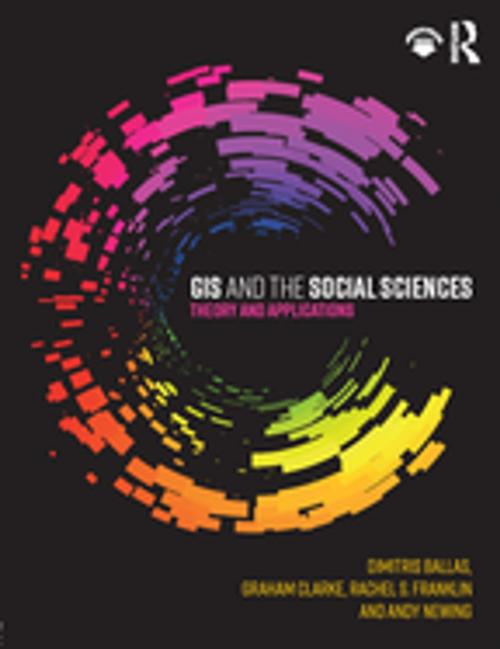GIS and the Social Sciences
Theory and Applications
Nonfiction, Science & Nature, Science, Earth Sciences, Geography, Social & Cultural Studies, Social Science, Human Geography| Author: | Dimitris Ballas, Graham Clarke, Rachel S. Franklin, Andy Newing | ISBN: | 9781317638827 |
| Publisher: | Taylor and Francis | Publication: | September 18, 2017 |
| Imprint: | Routledge | Language: | English |
| Author: | Dimitris Ballas, Graham Clarke, Rachel S. Franklin, Andy Newing |
| ISBN: | 9781317638827 |
| Publisher: | Taylor and Francis |
| Publication: | September 18, 2017 |
| Imprint: | Routledge |
| Language: | English |
GIS and the Social Sciences offers a uniquely social science approach on the theory and application of GIS with a range of modern examples. It explores how human geography can engage with a variety of important policy issues through linking together GIS and spatial analysis, and demonstrates the importance of applied GIS and spatial analysis for solving real-world problems in both the public and private sector.
The book introduces basic theoretical material from a social science perspective and discusses how data are handled in GIS, what the standard commands within GIS packages are, and what they can offer in terms of spatial analysis. It covers the range of applications for which GIS has been primarily used in the social sciences, offering a global perspective of examples at a range of spatial scales. The book explores the use of GIS in crime, health, education, retail location, urban planning, transport, geodemographics, emergency planning and poverty/income inequalities. It is supplemented with practical activities and datasets that are linked to the content of each chapter and provided on an eResource page. The examples are written using ArcMap to show how the user can access data and put the theory in the textbook to applied use using proprietary GIS software.
This book serves as a useful guide to a social science approach to GIS techniques and applications. It provides a range of modern applications of GIS with associated practicals to work through, and demonstrates how researcher and policy makers alike can use GIS to plan services more effectively. It will prove to be of great interest to geographers, as well as the broader social sciences, such as sociology, crime science, health, business and marketing.
GIS and the Social Sciences offers a uniquely social science approach on the theory and application of GIS with a range of modern examples. It explores how human geography can engage with a variety of important policy issues through linking together GIS and spatial analysis, and demonstrates the importance of applied GIS and spatial analysis for solving real-world problems in both the public and private sector.
The book introduces basic theoretical material from a social science perspective and discusses how data are handled in GIS, what the standard commands within GIS packages are, and what they can offer in terms of spatial analysis. It covers the range of applications for which GIS has been primarily used in the social sciences, offering a global perspective of examples at a range of spatial scales. The book explores the use of GIS in crime, health, education, retail location, urban planning, transport, geodemographics, emergency planning and poverty/income inequalities. It is supplemented with practical activities and datasets that are linked to the content of each chapter and provided on an eResource page. The examples are written using ArcMap to show how the user can access data and put the theory in the textbook to applied use using proprietary GIS software.
This book serves as a useful guide to a social science approach to GIS techniques and applications. It provides a range of modern applications of GIS with associated practicals to work through, and demonstrates how researcher and policy makers alike can use GIS to plan services more effectively. It will prove to be of great interest to geographers, as well as the broader social sciences, such as sociology, crime science, health, business and marketing.















